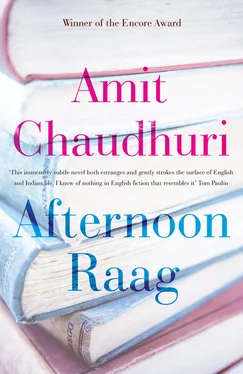Amit Chaudhuri - Afternoon Raag
Здесь есть возможность читать онлайн «Amit Chaudhuri - Afternoon Raag» весь текст электронной книги совершенно бесплатно (целиком полную версию без сокращений). В некоторых случаях можно слушать аудио, скачать через торрент в формате fb2 и присутствует краткое содержание. Год выпуска: 2015, Издательство: Oneworld Publications, Жанр: Современная проза, на английском языке. Описание произведения, (предисловие) а так же отзывы посетителей доступны на портале библиотеки ЛибКат.
- Название:Afternoon Raag
- Автор:
- Издательство:Oneworld Publications
- Жанр:
- Год:2015
- ISBN:нет данных
- Рейтинг книги:3 / 5. Голосов: 1
-
Избранное:Добавить в избранное
- Отзывы:
-
Ваша оценка:
- 60
- 1
- 2
- 3
- 4
- 5
Afternoon Raag: краткое содержание, описание и аннотация
Предлагаем к чтению аннотацию, описание, краткое содержание или предисловие (зависит от того, что написал сам автор книги «Afternoon Raag»). Если вы не нашли необходимую информацию о книге — напишите в комментариях, мы постараемся отыскать её.
Afternoon Raag — читать онлайн бесплатно полную книгу (весь текст) целиком
Ниже представлен текст книги, разбитый по страницам. Система сохранения места последней прочитанной страницы, позволяет с удобством читать онлайн бесплатно книгу «Afternoon Raag», без необходимости каждый раз заново искать на чём Вы остановились. Поставьте закладку, и сможете в любой момент перейти на страницу, на которой закончили чтение.
Интервал:
Закладка:
The furniture in Mandira’s room — the bed, the study-table, its chair, the cupboard, the bookshelves — was old, enduring. The armchair was solid and stoic, and seemed to cradle the space that existed between its thick arms; one felt protected when one sat in it. As I got to know Mandira better, as we became intimate and then grew increasingly unhappy, the room became her refuge, her dwelling, and when she said, ‘I want to go back to my room’, the words ‘my room’ suggested the small but familiar vacuums that kept close around her, that attended to her and guided her in this faraway country. Because, for a foreigner and a student, the room one wakes and sleeps in becomes one’s first friend, the only thing with which one establishes a relationship that is natural and unthinking, its air and light what one shares with one’s thoughts, its deep, unambiguous space, whether in daytime, or in darkness when the light has been switched off, what gives one back to oneself. The bed and chairs in it had an inscape, a life, which made them particular, and not a general array of objects. That is why, when she spoke of her room, I think what she meant was the sense of not being deserted, of something, if not someone, waiting, of a silent but reliable expectancy.
The room had other rooms next to it and other rooms facing it. Sometimes, I would come up the staircase and enter the corridor to find Mandira leaning out of a half-closed door talking to the American girl who lived opposite, who would be standing by her own door. Even when I was inside the room, they would continue their conversation, and I would sit on the chair and watch Mandira’s back; from there I could listen to the voice of the invisible girl, and to her rising peals of laughter. For ten minutes they would say goodbye to each other, until there came a rounded silence, and Mandira closed the door. What was missing was the background sound of old people and children, of babies and mothers, of families; instead one heard people running up and down the staircase, or visitors approaching and knocking. There was a toilet near the room whose cistern gurgled candidly each time someone flushed it, and a bath to which men in dressing-gowns went solemnly in the evening, and women with towels around their heads, less solemn and with an air of freedom. From the bath everyone returned radiant and clean, and slightly ashamed. As I passed to or from Mandira’s room, I would encounter them but not look at them, for I had learnt that the English do not consider it polite to look at each other, but nevertheless I remember the embarrassment of the men, and the opulent towels like Moorish turbans around the women’s hair.
4
Early mornings, my mother is about, drifting in her pale nightie, making herself a cup of tea in the kitchen. Water begins to boil in the kettle; it starts as a private, secluded sound, pure as rain, and grows to a steady, solipsistic bubbling. Not till she has had one cup of tea, so weak that it has a colour accidentally golden, can she begin her day. She is an insomniac. Her nights are wide-eyed and excited with worry. Even at three o’clock in the morning one might hear her eating a Marie biscuit in the kitchen. At such times, she moves gently as a mouse; we know it is her, and feel no danger. In the afternoons, she sleeps as a maidservant rubs cream on the soles of her feet. ‘My feet are burning,’ she says. At the base of her ankle is a deep, ugly scar she got when a car ran over her foot when she was six years old. That was in a small town which is now in Bangladesh. Thus, even today, she hesitates superstitiously before crossing the road, and is painfully shy of walking distances. Her fears make her laughable. The scar is printed on her skin like a radiant star.
Her hair is troublesome and curly; when she was young, it was even thicker than it is now. It falls in long, black strands, but each strand has a gentle, complicated undulation travelling through it, like a mild electric shock or a thrill, that gives it a life of its own; it is visually analogous to a tremolo on a musical note. It is this tremolo that makes her hair curly and unmanageable and has caused her such lifelong displeasure. The easiest way she disposes of it is by gathering it compassionately into a humble, medium-sized bun, rendering it graceful with a final plastic hair-clip, or by thoughtfully metamorphosing it into a single serpent-like plait that looks paradoxically innocent. When the maidservant cleans the room and sweeps the dust to one corner, one may notice there, among other things, a few black strands with delicate, questioning curves that always float away with the merest breeze.
In the bedroom there is a weighing-machine with a flat, featureless face. Solemnly, in the morning, when my father is still asleep, my mother slips off her nightie, which weighs no more than a feather, and, quite naked, embarks upon the machine; for she will leave nothing to chance, let no extraneous factor prejudice its judicious needle. When she is satisfied with what she has seen, appalled or happy, she will alight on to earth again, and slip on her nightie. Then with short steps (for she is no more than five feet and one and a half inches) she will cross all the way from the bedroom to the corridor to the hall to the veranda, making this long and lonely journey in the still hours of first light; there (on the veranda) she stands with the teacup balanced in one hand, pausing now and then in her thoughts (for she is always thinking) to sip her weak tea politely, watching the lane, in which Christian men in shorts are walking their Alsatians, with a genuine curiosity. Sometimes the famous music director, Naushad Ali, whose film songs we still hum in our solitary moments, can be seen walking down this lane with a cane in his hand and a companion by his side, his face wizened, almost Chinese, but humorous, gesticulating furiously with the hand that has waved at a thousand musical instruments, bringing a loud melody to life as he passes the sleepy lane. He is old now, in his eighties, and has suffered a few heart attacks. ‘So he is still alive,’ my mother thinks as she watches him. Meanwhile my father is sleeping in a most gentlemanly manner, taking care not to spill over into ungainly postures, his repose both stern and considerate as he lies on the bed with the quilt up to his chin.
After my father retired, we moved to this lane in the suburbs. Ours is the only apartment building in the lane; the rest are bungalows or cottages that belong to Christians. This is a Christian area; Portuguese names — Pedro, D’Silva and Gonsalves — twang in the air like plucked silvery guitar-strings. The Christian men are darkcomplexioned and have maternal pot-bellies, because they like drinking. The women wear unfashionable dresses, flowery purple skirts that resemble old English wallpaper, exposing polished, maroon ankles and dark knees which they cover by pulling at the skirt-ends with chaste, dutiful fingers. These women and men eat pork, and sing and dance in cottages lit with cobwebs and dim bulbs, some of which have dates upon their facades (1923), and some of which are named after some beloved greataunt (Helen Villa), no doubt a comical figure in her time. The Christians enjoy jokes and swear-words, and the women, when they are not sullen, are gently earthquaking with laughter at what John has just said with a straight face. They are in turn friendly, talking to you in queues at banks and post-offices, and short, taking offence when you innocently ask them for street directions. Most of them are Roman Catholic; when asked, they pronounce themselves ‘katlick’, a word that sounds both childishly mischievous and appropriately rude.
When my mother finishes her tea, she walks to the harmonium which is resting in the hall upon a carpet, covered by a tranquil garment. But if it is not in the hall, she will ask Ponchoo, the cook, who is now awake, to bring it to the hall, and this he will do, holding it by the two metal rings on either side, anxious not to bump it against a door or a wall, transporting its heaviness with a pregnant woman’s delicacy that dares not pause for breath, and with deep suspicion he will veer its precious body through the ins and outs of the corridor, and, bending humbly, lay it in its place on the carpet. Then my mother will settle on the rug and unclip the bellows, pulling and pushing them with a mild aquatic motion with her left hand, the fingers of the right hand flowering upon the keys, the wedding-bangle suspended around her wrist. Each time the bellows are pushed, the round holes on the back open and close like eyes. Without the body music is not possible; it provides the hollow space for resonance as does the curved wooden box of the violin or the round urn of the sitar. At the moment of singing, breath tips in the swelling diaphragm as water does in a pitcher. The voice-box itself is a microscopic harp, its cords tautening and relaxing with each inflection. My mother begins to practice scales in the raag Todi.
Читать дальшеИнтервал:
Закладка:
Похожие книги на «Afternoon Raag»
Представляем Вашему вниманию похожие книги на «Afternoon Raag» списком для выбора. Мы отобрали схожую по названию и смыслу литературу в надежде предоставить читателям больше вариантов отыскать новые, интересные, ещё непрочитанные произведения.
Обсуждение, отзывы о книге «Afternoon Raag» и просто собственные мнения читателей. Оставьте ваши комментарии, напишите, что Вы думаете о произведении, его смысле или главных героях. Укажите что конкретно понравилось, а что нет, и почему Вы так считаете.












